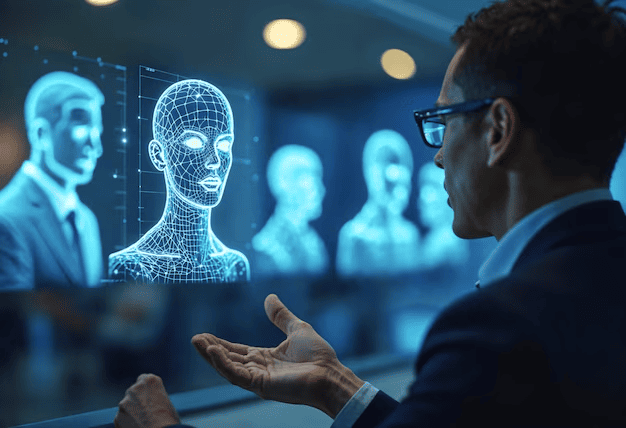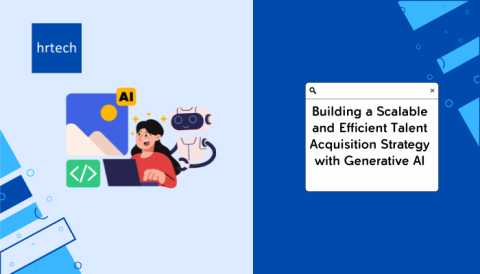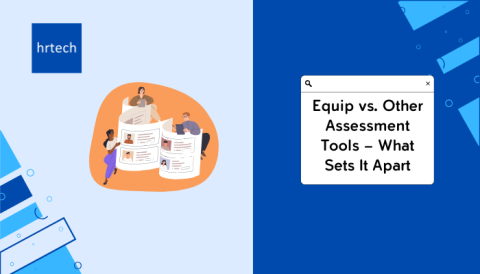Introduction
Hiring has long been a critical function for businesses, but traditional recruitment methods have often been slow, costly, and riddled with biases. Companies relied on manual resume screenings, face-to-face interviews, and gut feelings to make hiring decisions. However, these approaches had limitations—hiring managers could unintentionally favor candidates with similar backgrounds, and recruiters had to spend countless hours sifting through applications.
Enter Artificial Intelligence (AI). AI-powered hiring solutions are transforming the recruitment landscape, automating tasks that once took days or weeks to complete. AI can scan thousands of resumes in seconds, match candidates to roles based on skills and experience, and even predict how well a candidate will perform in a job.
In this blog, we’ll explore the key ways AI is redefining recruitment, from its benefits in speeding up hiring to its role in reducing bias, transforming candidate selection, and shaping the future of ethical hiring practices.
Benefits of AI Hiring Software for Speed and Accuracy
Traditional recruitment processes are time-consuming, often requiring HR teams to manually review resumes, schedule interviews, and conduct background checks. AI is revolutionizing this process, significantly improving speed and accuracy. Here’s how:
1. Automated resume screening
Manual resume screening is one of the most time-intensive tasks for recruiters. AI-powered Applicant Tracking Systems (ATS) can scan thousands of resumes in seconds, identifying top candidates based on predefined keywords, skills, and experience.
- Benefit: AI eliminates human errors, ensuring that no strong candidates are overlooked.
2. Predictive analytics for hiring success
AI-driven hiring platforms analyze historical data to predict which candidates are most likely to succeed in a particular role. These predictions are based on:
- Past hiring trends
- Employee performance metrics
- Market demand for certain skills
- Benefit: Companies can make more data-backed hiring decisions, reducing turnover and improving long-term employee retention.
3. AI chatbots for candidate engagement
AI chatbots are revolutionizing candidate communication by handling initial interactions, answering common questions, and even scheduling interviews.
- Benefit: Improves candidate experience and ensures timely responses, reducing drop-off rates in the hiring funnel.
4. Faster job matching with AI algorithms
AI-driven job matching tools analyze a candidate’s resume, skills, and experience against job descriptions, ensuring the best fit.
- Benefit: Reduces mismatches, ensuring companies hire candidates who align with job requirements.
- Example: Platforms like Pymetrics use neuroscience-based AI assessments to match candidates with the right job roles.
5. Reducing cost per hire
The average cost to hire an employee in the U.A.E is budgeted to be in between AED 4,500 and AED 8,000. AI-powered automation drastically reduces recruitment costs by optimizing sourcing, screening, and selection.
How Is Machine Learning in HR Eliminating Hiring Bias?
Hiring bias has been a persistent challenge in recruitment, often leading to a lack of diversity in workplaces. Unconscious bias—whether related to gender, ethnicity, age, or socio-economic background—can unconsciously influence hiring decisions, making it difficult for organizations to achieve truly fair hiring practices. However, AI and machine learning are changing the game by introducing data-driven, unbiased decision-making models. Here’s how:
1. AI-powered resume anonymization: Screening without bias
Traditional resume screening often leads to biased selection, as recruiters may unintentionally favor candidates with familiar names, education backgrounds, or personal details. AI-powered Applicant Tracking Systems (ATS) are designed to anonymize resumes, removing factors like:
- Candidate’s name (reducing bias related to gender and ethnicity)
- Age and graduation year (preventing age discrimination)
- Personal details (like address, which may trigger socio-economic bias)
Impact: By focusing purely on qualifications, experience, and skills, companies can ensure merit-based hiring.
2. Standardized skill-based evaluation over human judgment
Human decision-making in hiring often relies on intuition, which can be influenced by unconscious stereotypes. AI-driven assessments shift the focus from subjective impressions to objective, skills-based hiring through:
- AI evaluating candidates based on predefined role requirements
- Gamified AI-based aptitude and skills assessments
- Data-backed scoring models rather than recruiter intuition
Impact: This approach removes favoritism and ensures every candidate is judged purely on their abilities, making hiring more transparent and fair.
3. AI-powered bias detection and algorithm auditing
One of the biggest concerns with AI in hiring is the possibility of the algorithm itself inheriting biases from historical data. To combat this, machine learning models now come with bias detection and auditing features, including:
- Regular bias audits to identify patterns of discrimination
- Adjustments to algorithm weightings if bias is detected
- Transparency tools that allow HR teams to review AI-driven decisions
Impact: Companies can continuously monitor and improve AI performance to ensure hiring remains fair and equitable.
4. AI-enhanced job descriptions to attract diverse candidates
Even before candidates apply, job descriptions can create bias. Studies have shown that certain words discourage underrepresented groups from applying. AI tools can now
- Analyze job postings and flag exclusionary language
- Suggest inclusive alternatives to attract a broader talent pool
- Tailor descriptions based on gender-neutral and non-discriminatory wording
Impact: AI-generated job descriptions encourage applications from a more diverse range of candidates, leading to more equitable hiring.
5. AI-powered video interview analysis to remove bias
Traditional video interviews may be subject to bias based on appearance, accent, or personal characteristics. AI is now being used to analyze candidate responses objectively through:
- Speech pattern analysis instead of appearance-based judgments
- Natural language processing (NLP) to evaluate answers on relevance rather than tone or accent
- Automated scoring metrics that rank candidates based on structured criteria
Impact: This ensures candidates are assessed based on their responses and qualifications, rather than unconscious biases.
6. Ensuring diversity in final candidate selection
AI can go beyond screening and ensure diversity in the final hiring stages by:
- Recommending a diverse shortlist of candidates for hiring managers
- Identifying gaps in hiring patterns to encourage fairer selections
- Creating targeted recruitment campaigns to reach underrepresented talent
Impact: AI actively corrects systemic hiring imbalances by guiding HR teams toward more diverse hiring decisions.
By adopting AI-driven hiring solutions, companies can move closer to a truly unbiased recruitment process, ensuring a diverse, inclusive, and high-performing workforce.
AI’s Role in Transforming Recruitment
Artificial Intelligence (AI) is not just an upgrade to traditional hiring methods—it’s a game-changer. From enhancing candidate assessment to streamlining communication, AI is revolutionizing the entire recruitment process. Here’s how AI is making hiring faster, smarter, and more effective:
1. AI-powered video interviews
Hiring managers often make snap judgments based on a candidate’s appearance or mannerisms. AI eliminates this bias by analyzing responses objectively rather than relying on human perception.
How it works:
- Speech & language processing – AI evaluates a candidate’s choice of words, fluency, and clarity.
- Emotional intelligence mapping – Facial recognition assesses subtle expressions to gauge confidence and engagement.
- Behavioral analysis – AI studies tone and response structure to measure problem-solving ability.
Why it matters: AI ensures every candidate is judged on skills, not subconscious biases, leading to fairer hiring decisions.
Platforms like Recrew AI offer tools that eliminate bias, ensuring fairer assessments and better talent selection.
2. AI-driven reference checks
Traditional reference checks can be a slow and unreliable process, with inconsistent feedback from past employers. AI automates this task, delivering detailed and data-backed reference reports.
Key benefits:
- Automated surveys – AI sends structured questionnaires to references, reducing manual effort.
- Sentiment analysis – AI evaluates tone and language to detect genuine feedback vs. generic responses.
- Data-driven verification – Cross-referencing responses ensures accuracy.
Why it matters: AI speeds up reference verification while ensuring objective, reliable insights about a candidate’s past performance.
Recrew AI automates the reference checking process with precision, ensuring genuine feedback in a fraction of the usual time.
3. AI-powered job matching
Hiring the wrong candidate can be costly. AI helps companies match the right people to the right jobs by going beyond keywords and job titles.
AI evaluates:
- Skills and experience – Matching qualifications with job requirements.
- Company culture fit – Analyzing behavioral traits for workplace compatibility.
- Predictive success metrics – Assessing long-term potential based on past hires.
Why it matters: AI ensures better hiring decisions, reducing turnover and improving job satisfaction.
Recrew AI excels in matching candidates with their ideal roles, focusing on cultural fit and predictive success for optimal hiring outcomes.
4. AI in diversity & inclusion
Diversity and Inclusion (D&I) initiatives often struggle due to unconscious biases in hiring. AI helps level the playing field.
What AI does:
- Analyzes hiring trends – Identifies gaps in gender, race, and socio-economic diversity.
- Creates bias-free job descriptions – Recommends inclusive language to attract diverse candidates.
- Suggests diverse candidate pools – Expands recruitment reach beyond the usual networks.
Why it matters: AI ensures workplace diversity without compromising on quality, making hiring more equitable and data-driven.
5. AI-powered chatbots
Recruitment chatbots speed up communication, keeping candidates informed and engaged throughout the hiring process.
What AI chatbots do:
- Answer candidate FAQs – From salary expectations to job role details.
- Schedule interviews – Automate interview booking and reminders.
- Pre-screen applicants – Conduct initial qualification assessments.
Why it matters: Chatbots improve candidate experience, ensuring faster responses and smoother hiring journeys.
Recrew AI‘s chatbot solutions streamline candidate interactions, ensuring that every applicant stays informed and engaged.
6. Predictive hiring analytics
AI goes beyond recruitment—it predicts workforce success by analyzing hiring trends and performance data.
What AI predicts:
- Which candidates are most likely to excel
- Turnover risk before hiring
- Ideal career growth paths for employees
Why it matters: AI reduces bad hires, lowers attrition rates, and ensures better workforce planning.
Recrew AI provides predictive analytics that help HR professionals forecast success and improve workforce planning significantly.
By embracing AI-powered recruitment solutions, businesses can stay ahead in the competitive talent market, ensuring better hires, stronger teams, and smarter decisions.
Future of Ethical AI in Recruitment
While AI offers numerous benefits, ethical considerations are crucial. Companies must ensure AI hiring tools are transparent, unbiased, and constantly evolving.
1. Developing fair and bias-free AI models
Organizations must continuously refine AI models by:
- Using diverse datasets
- Regularly auditing AI-driven decisions
- Incorporating human oversight
2. Human-AI collaboration in hiring
AI can handle data-driven tasks, but human recruiters are essential for evaluating cultural fit, emotional intelligence, and personality traits.
- Future Trend: A hybrid hiring model where AI assists HR teams without replacing human decision-making.
3. AI-powered career development
AI is now being used beyond hiring to help employees with:
- Career path recommendations
- Upskilling and training programs
- Personalized learning plans
Conclusion
AI is revolutionizing recruitment by making hiring faster, fairer, and more efficient. By eliminating bias, automating processes, and enhancing decision-making, AI empowers HR teams to find the right talent with greater accuracy. As businesses evolve, embracing AI-driven recruitment is essential for building a more inclusive and data-driven workforce.
If you’re ready to transform your hiring process with AI, Recrew offers cutting-edge recruitment solutions to help you find the best candidates efficiently and fairly.
Explore how Recrew can redefine your hiring strategy today!





